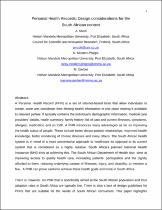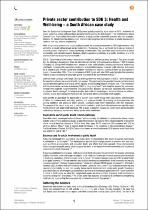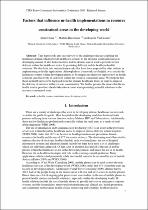JavaScript is disabled for your browser. Some features of this site may not work without it.
- ResearchSpace
- →
- Research Publications/Outputs
- →
- Conference Publications
- →
- View Item
| dc.contributor.author |
Mxoli, A

|
|
| dc.contributor.author |
Mostert-Phipps, N

|
|
| dc.contributor.author |
Gerber, M

|
|
| dc.date.accessioned | 2014-10-09T12:00:48Z | |
| dc.date.available | 2014-10-09T12:00:48Z | |
| dc.date.issued | 2014-09 | |
| dc.identifier.citation | Mxoli, A, Mostert-Phipps, N and Gerber, M. 2014. Personal Health Records: Design considerations for the South African context. In: DDR 2014, Cape Town, 8-10 September 2014 | en_US |
| dc.identifier.uri | http://hdl.handle.net/10204/7712 | |
| dc.description | DDR 2014, Cape Town, 8-10 September 2014 | en_US |
| dc.description.abstract | A Personal Health Record (PHR) is a set of internet-based tools that allow individuals to create, store and coordinate their lifelong health information in one place making it available to relevant parties. It typically contains the individual’s demographic information, medical care providers’ details, health summary, family history, list of past and current illnesses, symptoms, allergies, medication and so forth. A PHR introduces many advantages as far as improving the health status of people. These include better doctor-patient relationships, improved health knowledge, better monitoring of chronic illnesses and many others. The South African health system is in need of a more preventative approach to healthcare as opposed to its current system that is considered as a highly curative. South Africa’s planned National Health Insurance (NHI) aims at achieving this. The South African Department of Health also aims at improving access to quality health care, increasing patients’ participation and the dignity afforded to them, reducing underlying causes of illnesses, injury, and disability, to mention a few. A PHR can prove useful to achieve these health goals and more in South Africa. There is, however, no PHR that is specifically aimed at the South African population and thus adoption rates in South Africa are typically low. There is also a lack of design guidelines for PHRs that are suitable for the needs of South African consumers. This paper highlights design guidelines and other factors that should be considered when developing a PHR for use in the South African context. Guidelines related to the interoperability, comprehensiveness, legal value, and availability of PHRs are discussed. | en_US |
| dc.language.iso | en | en_US |
| dc.relation.ispartofseries | Workflow;13503 | |
| dc.subject | Personal health record | en_US |
| dc.subject | PHR | en_US |
| dc.subject | Lifelong health information | en_US |
| dc.subject | South African health system | en_US |
| dc.subject | National Health Insurance | en_US |
| dc.subject | NHI | en_US |
| dc.title | Personal Health Records: Design considerations for the South African context | en_US |
| dc.type | Conference Presentation | en_US |
| dc.identifier.apacitation | Mxoli, A., Mostert-Phipps, N., & Gerber, M. (2014). Personal Health Records: Design considerations for the South African context. http://hdl.handle.net/10204/7712 | en_ZA |
| dc.identifier.chicagocitation | Mxoli, A, N Mostert-Phipps, and M Gerber. "Personal Health Records: Design considerations for the South African context." (2014): http://hdl.handle.net/10204/7712 | en_ZA |
| dc.identifier.vancouvercitation | Mxoli A, Mostert-Phipps N, Gerber M, Personal Health Records: Design considerations for the South African context; 2014. http://hdl.handle.net/10204/7712 . | en_ZA |
| dc.identifier.ris | TY - Conference Presentation AU - Mxoli, A AU - Mostert-Phipps, N AU - Gerber, M AB - A Personal Health Record (PHR) is a set of internet-based tools that allow individuals to create, store and coordinate their lifelong health information in one place making it available to relevant parties. It typically contains the individual’s demographic information, medical care providers’ details, health summary, family history, list of past and current illnesses, symptoms, allergies, medication and so forth. A PHR introduces many advantages as far as improving the health status of people. These include better doctor-patient relationships, improved health knowledge, better monitoring of chronic illnesses and many others. The South African health system is in need of a more preventative approach to healthcare as opposed to its current system that is considered as a highly curative. South Africa’s planned National Health Insurance (NHI) aims at achieving this. The South African Department of Health also aims at improving access to quality health care, increasing patients’ participation and the dignity afforded to them, reducing underlying causes of illnesses, injury, and disability, to mention a few. A PHR can prove useful to achieve these health goals and more in South Africa. There is, however, no PHR that is specifically aimed at the South African population and thus adoption rates in South Africa are typically low. There is also a lack of design guidelines for PHRs that are suitable for the needs of South African consumers. This paper highlights design guidelines and other factors that should be considered when developing a PHR for use in the South African context. Guidelines related to the interoperability, comprehensiveness, legal value, and availability of PHRs are discussed. DA - 2014-09 DB - ResearchSpace DP - CSIR KW - Personal health record KW - PHR KW - Lifelong health information KW - South African health system KW - National Health Insurance KW - NHI LK - https://researchspace.csir.co.za PY - 2014 T1 - Personal Health Records: Design considerations for the South African context TI - Personal Health Records: Design considerations for the South African context UR - http://hdl.handle.net/10204/7712 ER - | en_ZA |









